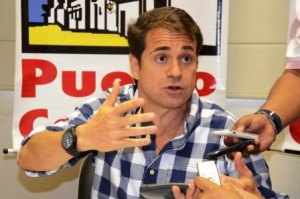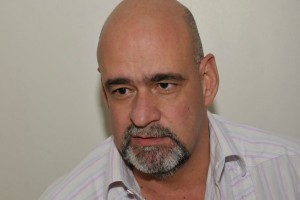16-D Races to Watch: Carabobo
 The central state of Carabobo, known as our historical and industrial heartland, presents an interesting case for the 16-D election.
The central state of Carabobo, known as our historical and industrial heartland, presents an interesting case for the 16-D election.
The comandante presidente won there this year but Chavismo obtained the State governorship only once: in 2004, with former National Guard General Luis Felipe Acosta Carles and a little help of high abstention provided by opposition voters.
Since direct regional elections begun in 1989, two men named Salas have ruled Carabobo for 19 years combined: Henrique Salas Römer, for six, and his son, incumbent governor Henrique Salas Feo, for thirteen. Now the son is looking to stay in power for four more, but he’s vulnerable. Even if abstention is lower than eight years ago, he could still lose.

Governor Henrique Salas Feo, candidate for the MUD
“El Pollo” (Salas Feo’s nickname) was close to be primaried last year, with a strong rival (Enzo Scarano, Mayor of San Diego Municipality) having a serious chance to defeat him then.
But the MUD decided that all incumbent governors would avoid a primary unless a clear majority of its members opposed this. Instead of running solo and risking unity, Scarano backed down and settled for his own re-election.

Valencia Councilman Noé Mujica, candidate for the Wide Front for Change and Reconciliation of Carabobo.
But not everyone accepted this outcome. South Valencia Councilman Noé Mujica insisted in challenging Salas Feo to a primary and after having his request denied by the MUD, he’s now running alone as an independent.
Supported only by some small parties, Mujica doesn’t have a real chance of winning, but if the result is very close, he could end up in history as the Ralph Nader of Carabobo.He insists that he is the true candidate of change.

Rafael Lacava, Mayor of Puerto Cabello (PSUV)
Chavismo thinks they have a big chance of winning Carabobo again, thanks to possible “Salas fatigue” of some voters. But some consider that having the wrong candidate could ruin those chances.
After testing the waters with outsider Nicolas Maduro (now the VP), all pointed to Puerto Cabello Mayor Rafael Lacava, who had serious support from the base.

Francisco Ameliach, candidate for the PSUV-GPP
But in the PSUV, the participatory democracy is really a “dedo-cracy” of one single protagonist: Hugo Chávez. He selected former Parliament’s Speaker and PSUV apparatchik Francisco Ameliach.
Even if he’s a local, not all Carabobo chavistas were thrilled at the comandante presidente’s decision. However, jefe es jefe and Lacava was the first one to toe the official line. (It helps that Lacava is a longtime ally of Ameliach’s)
The first opinion poll gives Ameliach a small lead over Salas Feo, but the race is still very competitive. “El Pollo” must maximize his support while praying that Chavistas stay home. Ameliach must do the same, but the other way around. Carabobo, the place where Venezuela won its independence not once but twice, really matters to both sides.
Caracas Chronicles is 100% reader-supported.
We’ve been able to hang on for 22 years in one of the craziest media landscapes in the world. We’ve seen different media outlets in Venezuela (and abroad) closing shop, something we’re looking to avoid at all costs. Your collaboration goes a long way in helping us weather the storm.
Donate




